A Cinemarati Special Feature
>> Click here for companion pieces by other Cinemarati critics! <<
I usually spend a lot of the year in eager anticipation of the Oscars. This year, however, at this moment, I find myself thrilled that they are still six months away. Hollywood, Rip Van Winkle-like, has slept through the first half of 2003. Even the most lucrative hits have been liked more than loved (Finding Nemo, Bruce Almighty), several franchise pictures have failed to build an audience beyond their pre-existing loyalists (The Matrix Reloaded, 2 Fast 2 Furious), and the most promising exceptions to the standard blockbuster recipe have died quick deaths at the box-office (Down with Love). Meanwhile, the foreign and independent filmmakers, whose usual job is to counteract the largesse and laziness of corporate studios, haven't fared any better. Crossover hits have been precious few, and most of them, from Bend It Like Beckham to Whale Rider turned out to be safer, more tepid entertainments than their festival buzz had indicated.
All, however, is not lost. After all, we still have the second half of 2003 to go, the part of the calendar for which all the studios and distributors tend to save their top-shelf prospects anyway. I hope you'll check out next week's companion feature, The Ten Most Wanted..., where I look ahead to some of the movies, performances, and other tantalizing movieland prospects that await us before the year's end.
Plus, even in a sub-par year, the movies have still yielded a few memories and mini-achievements that are worth remembering at the halfway point. In cooperation with all of my fellow reviewers at Cinemarati, the Web Alliance for Film Criticism, I have named my own list of the Best of 2003 So Far. You can see my selections below, and soon you'll be able to check out the choices of the other critics at this link. I hope you will also feel free to share your thoughts of what you've liked best (and least) at the cinema so far this year, and to tell me what you're most looking forward to in the coming months!























Best Production Design
Thérèse DePrez, How to Lose a Guy in 10 Days
 
|
Down with Love was more ostentatious, which was fun as far as it went, but the visual deliciousness of How to Lose a Guy in 10 Days was sleeker, subtler, and thus a more pleasant surprise. As I commented in my review of the film, a sad trend in latter-day Hollywood is the decline of visual beauty in major-studio pictures. Big bucks are consistently shelled out for superstar actors or explosive CGI, but in their wake, the pleasures of bright, coordinated colors, snazzy sets, and elegant, flattering outfits have gone the way of the dodo. How to Lose a Guy..., one of the year's few word-of-mouth hits, hopefully represents in its modest way a reversion to class, polish, and visual appeal even in "throwaway" pictures. Given Thérèse DePrez's origins in indie films like Hedwig and the Angry Inch, the movie hopefully indicates, too, that vivid, eccentric talents from the moviemaking fringes might be incorporated into mainstream fare without sacrificing all of the pizzazz and detailed originality that got them hired in the first place. (Had I bestowed similar mid-year awards in 2002, I would have given this prize to About a Boy, which got almost everything wrong except the haircuts, wardrobe, and set accessories.) |























Harris Savides, Gerry
|
Gus Van Sant's minimalist two-character drama Gerry was not a film that I loved. Most of what was initially pleasing in the film's spare construction and narrative reticence grew unnecessarily repetitive as it continued, and the O. Henry-ishness of the denouement burdened the movie with more ironic weight than it could bear. Throughout, however, Harris Savides' images managed two impressive and difficult tasks. First, the whole movie has the clean, imposing, bone-dry beauty of Georgia O'Keefe. Second, in the absence of dialogue, backstory, or even much plot, Savides' careful framing of the space between Casey Affleck and Matt Damon becomes its own drama, a vacillating rhythm of intimacy and separation that achieves, at moments, an incredible poignancy. Van Sant simply isn't, as yet, a strong enough screenwriter or director to maintain any of his high-concept ideas over a feature-length period, and Gerry loses itself as surely as its characters do. But Savides is not to blame, and in fact, he deserves credit for keeping the film on course as long as he does. |
 |























Best Supporting Actor
Phelipe Haagensen, City of God
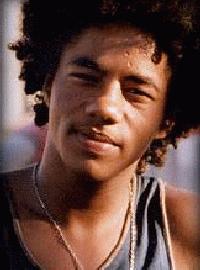 |
Most of the performers in Fernando Mireilles' international hit City of God are non-actors, hired to imbue the film with the sort of personal, habitual authenticity that directors from Bresson to Kiarostami have sought amidst their own non-professional casts. Still, in the role of Bené, the flawed but morally earnest martyr of the Rio de Janeiro street wars, Phelipe Haagensen attains a level of quiet emotional force that even trained actors rarely achieve. (Perhaps it is because they are trained that most actors cannot act such complex emotions with such apparent, trickless purity.) True, the script helps to set Bené and Haagensen apart. He is a heroic figure in the eyes of the film's young protagonist, and his assassination on a disco floor—a scene John Woo might have relished—emerges as a narrative and emotional turning point for most of what follows in this sprawling, chaotic story. But the film's semi-romantic conception of the character does not itself account for how deeply the viewer is affected by Bené. From his diplomatic gift for calming his gunslinging brother, to his absurd enthusiasm for faddish '70s clothes, to his fatal inability to break completely from the community (and the criminality) that spawned him, Bené is both a human and a tragic figure. Most of the actors and much of the film strive for this same balance, but Haagensen is alone in achieving it so perfectly, and for making it look so easy. |























Patricia Clarkson, All the Real Girls
|
Patricia Clarkson ended 2002 as Julianne Moore's best friend in Far from Heaven, lending exquisite actorly support even as her character withdraws her own compassionate support. Clarkson was barely recognizable here from her breakout role as a German-emigré junkie in 1998's High Art, nor from the smallish parts in The Green Mile, Joe Gould's Secret, and Playing by Heart that would not have been at all memorable if this particular actress weren't playing them. Clarkson has become ubiquitous in 2003, showing even more sides of her eerie, sharply intellectual talent. The Station Agent, Pieces of April, and Lars von Trier's Dogville will all debut to commercial audiences in the fall, but early in the year, she stole the film All the Real Girls in just three or four scenes as Paul Schneider's mother, a brassy furniture stripper who moonlights as a clown in a children's cancer ward. If the notion of a happy clown who cries in private is familiar to you, you might well have been reading a high-school literary magazine lately, or at least been listening to Smokey Robinson. But Clarkson pierces both the clichés of her character and the woozy poetic dreaminess that generally typifies All the Real Girls. It is not a performance that struck me as award-caliber at the time, nor would it now, if 2003 had yielded more performances and moments to rival it. Nonetheless, not a single acting moment in the last six months has survived so clearly in my memory as her tearful, semi-recriminating breakdown in front of her son. |
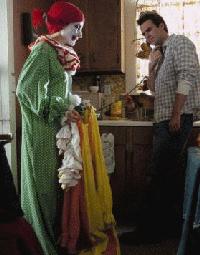 |























Best Actor
Shia LaBeouf, Holes
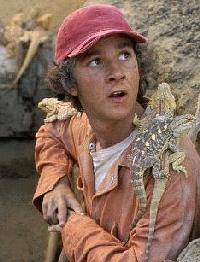 |
Nick Nolte probably went deeper in The Good Thief, though the sheer unnecessity of that film—why bother to make that film, much less re-make it?—weighs against the power of his playing. Ewan McGregor showed verve in Down with Love, but it's hardly a classic turn for him, and he's working too hard at times to keep the balloon in the air, to save the screenplay from its own overdrawn impulses. Having discounted these two, my favorite lead performance from a male actor so far this year was probably Shia LaBeouf's in Holes, a live-action fable from Disney/Touchstone that was weirder, less predictable, and more involving than anything I saw in the arthouse circuit all spring. Hard to tell if LaBeouf is a born thesp—his follow-up part, a nonsensical supporting role in Charlie's Angels: Full Throttle, hardly settles the question. But the easy, normal-kid naturalism that LaBeouf exudes as Caveman, an almost total ordinariness except for his wonderfully open face and serene, sensitive demeanor, is an extremely welcome contrast to the broad overplaying of most pre-teen actors. The movie needs LaBeouf as a calm, understated center, to balance all of its wild forays into lethal lizards, abstract labor, and Eartha Kitt. Some great acting is showstopping, a thing apart; great acting also inheres, though, in giving exactly the performance which the shape and structure of the movie require. Whether or not LaBeouf is "great," he carries Holes beautifully on his shoulders, and he makes us want to see where he'll go. |























Catherine O'Hara, A Mighty Wind
|
Technically, A Mighty Wind is an ensemble piece, but make no mistake that Catherine O'Hara sets herself apart. She is the lead, or at least the co-lead, in this picture—her reunion scenes with Eugene Levy are the scenes that carry the rest of this listless, underconceived film on their back. Frankly, O'Hara is also carrying Levy on her back; while his acting grows more mannered and grotesque the nearer he approaches the spotlight, O'Hara deepens her past comic-ensemble portrayals and finds something serious and sad in her character, something that can propel a movie which desperately needs an engine. She sings well, and she inhabits her crazy wig and peasant clothing quite comfortably. She intermittently flubs her Midwestern vowel sounds, but that's no big thing. A Mighty Wind finds a few different ways to wear out the welcome of the Christopher Guest improv-troupe formula, but O'Hara alone emerges as the actor we still want to know more about. In Hollywood's golden days, whatever lucky studio controlled her career would have happily inserted her into any movie it could—think of how Thelma Ritter, Una Merkel, Edna May Oliver, and other comic character actresses popped up hither and thither and always adjusted their signature style to disclose some other nuance of their persona or some other latent potential buried within their customary bag of tricks. O'Hara has that same flexible, resourceful, and funny quality, and I hope she gets the kind of recognition that allows her to use it more often. |
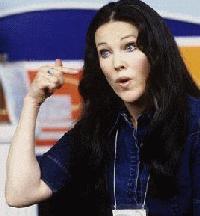 |























Best Director
Jonathan Mostow, Terminator 3: Rise of the Machines
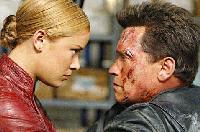 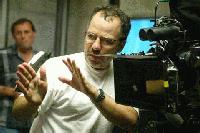 |
The summer has been littered with underperforming and unloved sequels, but ironically, the one I was most dreading is the one that pleased me most. Terminator 3 had either the bad luck or the great fortune to follow up on two films that are well-cherished even beyond the customary bounds of their genres. The Terminator movies are the kinds of sci-fi crowd-pleasers that hoity-toity eggheads can also get behind—they are, in fact, ideal evidence of how sci-fi "geeks" are often way ahead of the rest of us—and they have always made a point of putting male and female characters on equal footing. I presumed that Terminator 3, which carries over precious little of either the on-screen or behind-the-camera talent, would essentially toss the whole recipe and just haul in whatever combustible set-pieces it needed to get the dough rolling in. But Jonathan Mostow, a director I've always liked, finds a wonderful balance between the conceptual sophistication of the early movies and the inherent silliness of second sequels, between the need to resuscitate Arnold's career and the undeniable fact of his aging, fossilized appeal, between the original paranoia of The Terminator ("Machines will take over the world!") and the everyday reality of 2003 (machines clearly have taken over the world). I wouldn't say Mostow & Co. necessarily improve on their foundation, but they do venture further into the scruffy, B-movie heritage of the series, which Terminator 2 was a little too self-serious to allow, and both pace and information are marshalled out with impressive panache and precision. T3 would be a proud piece of work for any director; for a director-for-hire, it's an especial accomplishment. Bring on T4! |























None
|
So, yes, here's where I get really crabby. T3 is marvelous fun and smart enough to chew on, but is it quite "Best of Year" material, even "Best of Year So Far"? Finding Nemo is eye-popping to watch, but it doesn't survive nearly as strongly in the imagination as the best animated movies do. 28 Days Later packs a real punch, but much of the credit must go to the times in which we're watching it, in excess of the film's own cleverness or craft. And All the Real Girls is a perplexing case: I am never quite through telling someone how beautiful and intriguing it is before a voice in the back of my mind says, "Yeah, but would you ever want to see it again?" So, rather than name any of them as the top of the 2003 crop, I'll deny that prize across the board. Filmmakers, you could do better. Inevitably, some of you will, too, even before the year is out. And if you check back here next week, I'll name the ten films (plus some other craft-specific prospects) that I'm counting on most to break the drought... |
 |
Click here for Ten Most Wanted Films, More Hot 2003 Leads, and Oscar Nomination Predix!